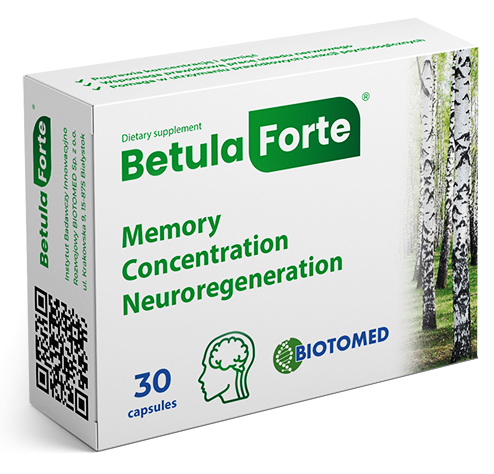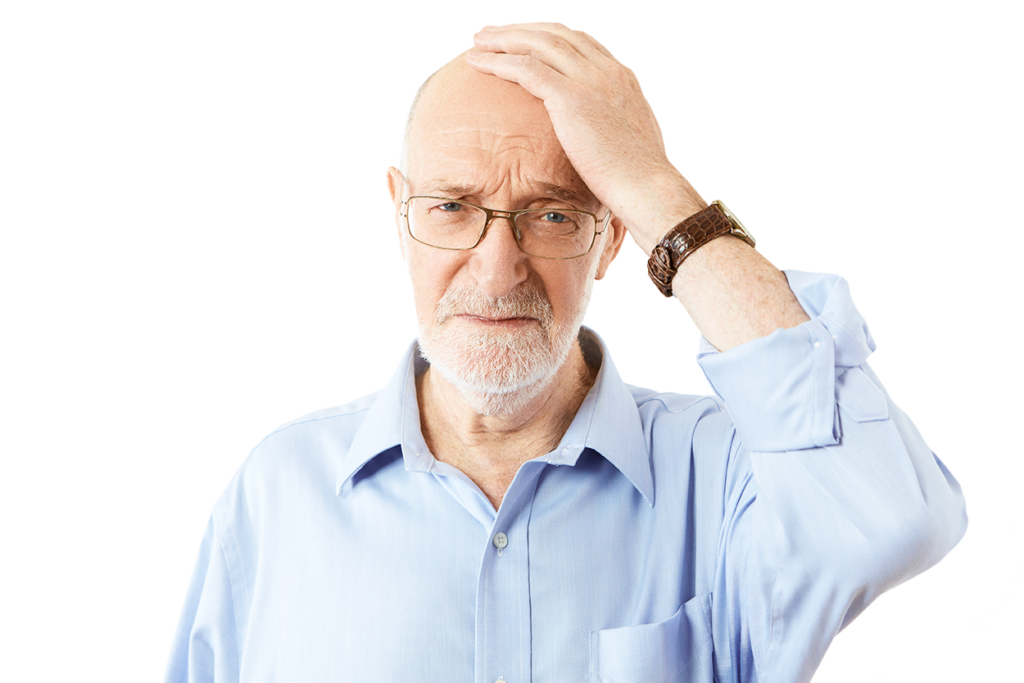
BetulaForte dietary supplement
is intended for people who, want to:
- improve intellectual performance and concentration,
- improve short- and long-term memory,
- get rid of brain fog and improve perception,
- stimulate brain activity.
BetulaForte dietary supplement was created to comprehensively support intellectual performance and improve your brain function. It is an excellent solution if you care about improving the cognitive functions of the brain, you have a job requiring focus, you have problems with memory and concentration. BetulaForte is the first dietary supplement in Poland to contain a unique ingredient - Betulin. Due to its neuroprotective effect, BetulaForte product is worth using already at the first problems with memory (e.g. in the elderly).
Composition
Ingredients | Content in 1 capsule. | RWS* in 1 capsule. |
Betulin | 50 mg | – |
Tiamin (Vitamin B1) | 0,33 mg | 30 % |
* RWS – Reference Intake Value.
Ingredients: Gamma-cyclodextrin, bovine gelatin, birch bark extract (betulin), maltodextrin, microcrystalline cellulose, calcium carbonate, modified starch, magnesium salts of fatty acids, thiamine mononitrate (vitamin B1).
Betulin (from the Latin Betula) is a chemical compound naturally found in birch bark, giving it its proper white hue. As a substance, it is in the form of a white or almost white crystalline powder. The properties of betulin were known as early as in the Middle Ages, and are confirmed by descriptions of its medicinal properties available in European medical books.
Plants containing betulin were used in natural medicine and herbal medicine not only in Europe, but also in North America. The main use of birch bark extract was to treat tuberculosis and diseases of the lymphatic system. Currently, betulin also shows properties that support the course of neurodegenerative diseases - Alzhaimer. In addition, it is credited with many health-promoting properties, including anti-allergic, anti-inflammatory, anti-tumor, antiviral, hepatoprotective and anti-cancer properties.
Alzheimer's disease
Alzheimer's disease is a type of dementia caused by brain damage. Since 1999, September 21 has been celebrated as World Alzheimer's Day, and the entire month of September September is a time when doctors, but also relatives of patients and patients themselves, try to draw the attention of healthy people to this disease, which is affecting more and more people.
According to calculations by Alzheimer's Disease International, founded in 1984 (ADI), globally someone develops some type of dementia every 3 seconds, that's one second faster than in 2015. It is estimated that today there are between 15 to 21 million people, and in Poland this number has already exceeded 350,000. If we add to this other forms of dementia, we have more than half a million patients in Poland. ADI's December 2021 World Alzheimer's Report states that. there are more than 41 million undiagnosed cases of dementia worldwide. 75% of all dementia cases remain undiagnosed, with 90% of these in low- and middle-income countries. Stigmatization of the clinical diagnosis continues to be a major obstacle to diagnosis, with 1 in 3 people believing that nothing can be done about it. 90% of clinicians noted delays in dementia diagnosis caused by COVID-19.

Western societies are aging, so the number of sufferers is growing at such a rate that, according to
ADI, 131.5 million people will suffer from various types of dementia in 2050. At the same time, 2 out
of 3 people who were asked if they knew anything about dementia caused by brain damage said they
had no detailed information on the subject. To date, the disease remains incurable. Among those
over 65, the incidence is put at 10 percent, around age 60 it is 2 percent, and closer to age 80 it is as
high as 50 percent. The disease is most common in people over 65, but not only. It is increasingly
affecting young people. Medical diagnosis is the beginning of a long and difficult disease, which
generally lasts from 2 to 20 years. The disease manifests itself with increasing mental dementia. The
patient begins to forget basic things related to work or daily activities, forgets words, names, gets
lost in familiar places. Over time, the patient stops recognizing loved ones, can't tell where he or she
is, can't perform any activity independently, has no control over physiological activities.
The disease affects not only the patients themselves, but also their loved ones. The constant care of
an Alzheimer's patient requires unheard-of mental and physical effort. Despite very intensive
research work, there is no effective treatment to prevent the development and stop the disease
process. It is only possible to delay and alleviate symptoms such as anxiety, depression, psychosis,
excessive psychomotor agitation and sleep disorders. In the fight against the disease, the most
effective support for sufferers and their families is knowledge, compassion, patience, kindness and
love. Contrary to popular belief, these disorders do not affect only the elderly and are not a normal
symptom of aging. The burden of medical, financial and social care for people who lose the ability to
live independently is assumed by loved ones. However, they need support and kindness from those
around them, as well as information and professional advice, so that they can bear the
extraordinarily heavy burden of caring for a chronically ill person with memory loss.
Symptoms of the disease
10 major warning signs:
1. memory disorders that impede daily functioning.
2. Difficulty in performing daily household chores.
3. language disorders.
4. Confusion about time and place.
5. Trouble with judgment.
6. Disorders of abstract thinking.
7. losing things.
8. fluctuating mood.
9. personality changes.
10. loss of initiative.
In the first stage
(minor dementia), the following symptoms can be expected:
- Leaving things in the wrong places,
- Searching for basic items at home,
- Repeating questions and comments,
- Short-term memorization of information and learned activities,
- Problems with telling to the end of a speech that has been started,
- Difficulties finding their way in a new place,
- Repetitive activities, such as cleaning,
- Eating meals, taking medications,
- Decrease in activities and interests, depression, sleep disorders.
In the second stage
(moderate dementia) the following symptoms can be expected:
- Short- and long-term memory disorders,
- difficulty recalling words,
- psychomotor hyperactivity,
- forgetting the main thread in the middle of a conversation,
- Problems with orientation in familiar surroundings,
- Difficulties with dressing, using cutlery, recognizing people,
- Irritability, impulsiveness, stubbornness, verbal and physical aggression,
- Disorders of the diurnal rhythm (treating day as night and vice versa),
- Visual and auditory hallucinations,
- Misrecognition syndrome (e.g., talking to the TV).
In the third stage
(deep dementia) the patient is unable to
to function independently:
- does not recognize loved ones,
- does not orient itself in time,
- does not produce or understand speech,
- does not perform basic life activities
vital functions.


